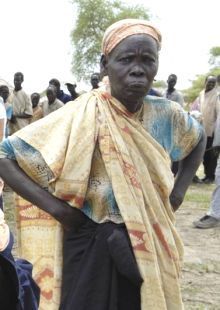Abyei of Dinka Ngok’s nine chiefdoms has no electoral constituency
By James Gatdet Dak
June 19, 2009 (JUBA) – The contested region of Abyei has been denied geographical constituency for the upcoming general elections, said the Government of Southern Sudan’s (GoSS) Acting Spokesperson and Minister of Telecommunications and Postal Services, Madut Biar.

Machar, who returned from Khartoum on Friday after five days of debates on referenda laws for Southern Sudan and Abyei, told the cabinet meeting that the National Electoral Commission (NEC) had not allotted any geographical constituency for the Abyei area.
He said the matter was brought to his attention while in Khartoum by members of the Ngok Dinka in the Abyei administration.
Machar said he then contacted the Chairman of the Electoral Commission, Abel Alier, who confirmed to him that his Commission did not allot any geographical constituency to Abyei.
He said Abel Alier explained to him that the region was not mentioned in the Electoral Law, which was passed this year by the National Assembly, and therefore could not qualify to get a geographical constituency.
Constituencies are being allotted by the Commission based on the recently declared population census results and as the basis for representation in the National Assembly and contest in the coming elections in February 2010.
In a related development, Machar also explained that Abyei’s population, as a semi-autonomous region, had not appeared separately in the recently declared population census.
Its population has been instead put under Warrap state by the Census Bureau with a population of only 52,000 inhabitants.
This number of population, even if featured independently under Abyei area, may not qualify for a geographical constituency, according to the new Electoral Law.
Abyei, which falls within northern Sudan according to the 1956 boundary, has an interim administration and interim boundaries established under the Abyei roadmap agreement signed in 2008 after three years of stalemate.
The permanent boundaries are being sought in the tribunal court in The Hague where both parties to the CPA had presented their respective arguments in accordance with the Abyei Boundary Commission (ABC) Report.
The verdict for the region’s boundaries is expected next month, which will determine the territory for the nine Ngok Dinka chiefdoms.
The people of Abyei are also scheduled to hold a referendum concurrently with the people of Southern Sudan in 2011 to determine their future political destiny.
The region is administered under the Presidency in Khartoum in accordance with the Abyei Protocol of the Comprehensive Peace Agreement (CPA) signed in 2005.
These latest issues of its population and non-geographical constituency are expected to be resolved at the Presidency.
(ST)
